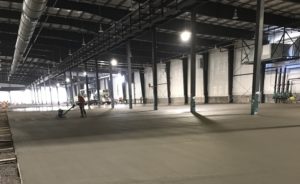
Big box stores, warehouses, and manufacturing facilities need industrial concrete floors that are flat and level to accommodate forklift traffic and stacking of goods on pallets. Concrete slabs on ground tend to curl and warp near the joints. A curled slab can be hazardous to forklifts, limit how high pallets can be safely stacked, or interfere with delicate manufacturing processes.
Primekss is a Latvian company with a patented process for making industrial concrete floors. They design fiber-reinforced concrete for jointless industrial concrete floors. No joints mean much less curling. Concrete slabs on ground tend to wear more at the joints, so a jointless floor holds up better under forklift traffic.
Specifying industrial floors
Specifying concrete for an industrial floor is not mainly about compressive strength. Concrete shrinks on drying – that’s why slabs crack – but it’s possible to design it to shrink less by using more aggregate and less water. On the other hand, you also need enough water to make the concrete workable – that is, easy to place, consolidate, and finish. Proper proportioning of the materials is key.
In addition to making sure there’s enough water but not too much, it’s important not to entrain air. The hard-trowel finish you need to stand up to forklift traffic is not compatible with air entrainment.
Although Primekss has much experience designing industrial concrete floors in Europe, it’s relatively new to the US. By partnering with Beton, they benefit from our knowledge of local materials.
If need be, we can visit the job site to make sure everything goes as planned. We can also conduct static plate load testing to ensure that the soil can adequately support the slab above it.
